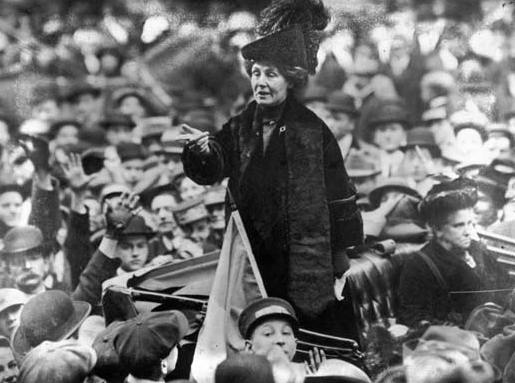The 100: Looking Back on the Suffragette Movement Today in Manchester
- stfmcgill

- Aug 6, 2021
- 3 min read
Updated: Mar 6, 2023
Written by Gabrielle Thomas
March 8, 2018
Happy International Women’s Day. I’m celebrating with you and writing to you from across the pond in Manchester. I’ve stopped for a coffee on the main road and watch as city-going people walk by. The sun is out today and everyone who passes is accompanied by a shadow following at their feet. I think of the shadows that accompany me today.
More than a hundred years ago, Emmeline Pankhurst walked these Mancunian streets. Born in Moss Side in Manchester, she was one of the most important and influential figures in the history of women’s suffrage. Described by TIME as “The Agitator”, Pankhurst “shaped an idea of women for our time; she shook society into a new pattern from which there could be no going back”. She was a founding member of the Women’s Social and Political Union. With her as its figurehead, in the face of increased government repression and violence, the suffragette movement deployed several controversial tactics, including arson, violent protest and hunger strikes. Although many people disagreed with her, today her work is recognized as a crucial element in achieving women’s suffrage in Britain.
Emmeline Pankhurst may not be the sum total of the suffragette movement but all of her voiced ideas, words and deeds played key roles in the social and political reform that came afterward. She recognized that she was a part of a whole, bigger picture but had a deep conviction that she had the power to make an impact. Each person belongs to a bigger picture but behind each person, another picture can be uncovered. In her autobiography Suffragette: My Own Story, Pankhurst discusses her relationship with her husband, Richard Pankhurst, a barrister who was known for supporting women’s rights to vote. She writes:
I think we cannot be too grateful to the group of men and women, who, like Dr. Pankhurst, lent the weight of their honoured names to the suffrage movement in the trials of its struggling youth. These men did not wait until the movement became popular, nor did they hesitate until it was plain that women were roused to the point of revolt. They worked all their lives with those who were organising, educating and preparing for the revolt which was one day to come. Unquestionably those pioneer men suffered in popularity for their feminist views. Some of them suffered financially, some politically. Yet they never wavered.
To have the unwavering support of someone you love is powerful and so lucky. To stay believing in something unashamedly in the face of critics and disbelievers is miraculous. To fight for equality in your life time and to empower those around you to follow is meaningful in a way that surpasses words. These feelings are not unique to Emmeline Pankhurst’s life or even to those of British women – they are universal truths.
This year marks the centenary of the Representation of the People Act that gave 8.5 million more women the right to vote in the UK. It is so hard to imagine the feeling of being given something we so often take for granted today. When I put myself in that time, I’m always stumped by a question: Would I have been one of those courageous women? I’d certainly like to think so but still, I don’t know.
However, I do know that some day, people will be writing articles about the time we live in now. They’ll be talking about what women are currently living through around the world with the #MeToo and Times Up movements and they’ll be talking about the persisting lack of education access equality in developing countries. They will also be talking about what we did to fix things. They’ll still be talking about Emmeline Pankhurst and they’ll be talking about all those people who weren’t necessarily the sum totals of their movements but who dedicated their lives to making a difference. I certainly still have a chance to be one of those people.
Today, there are so many steps that can be taken to make a change. Mariya Voloshyn, our She’s the First McGill president has attainable action ideas listed in her interview here.
Today, as I leave my spot on the side of the road, the sun illuminates the shadows and the stories of the women who came before me. It’s our turn to give our projects our all now. I think of that line from Mary Oliver’s poem “The Summer Day”… “Tell me, what is it you plan to do with your one wild and precious life?”
Read the Guardian’s piece on the centenary here




























Comments